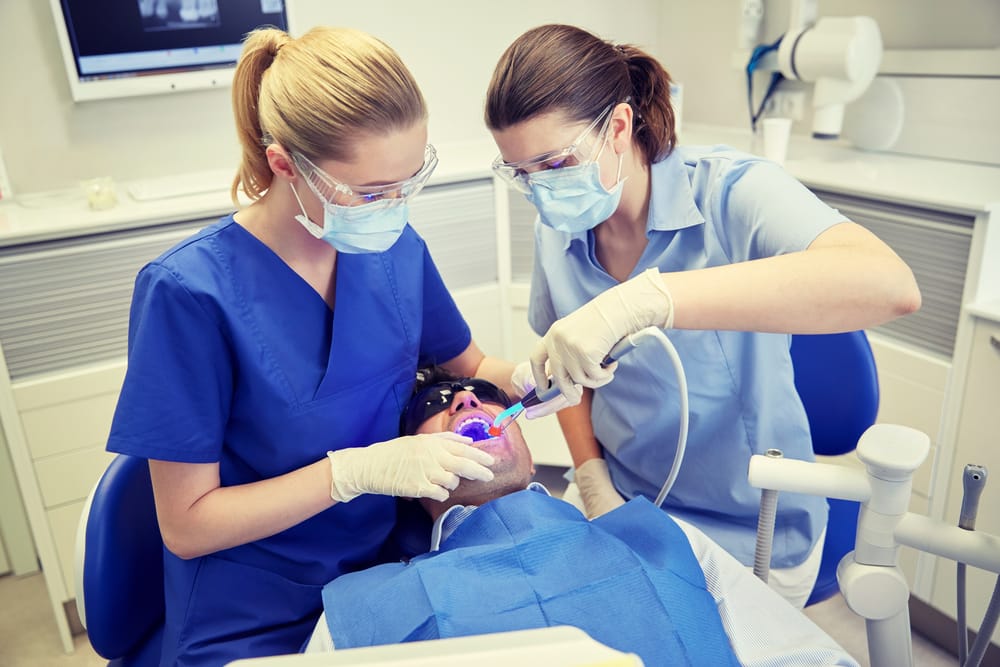The emergence of artificial intelligence has had a vital impact on the dental health industry. Today, it can be widely implemented to enhance advanced clinical practices by offering practitioners support in crucial tasks and activities. Some of them include treatment planning, diagnosis, and follow-up of patients. The technology can be utilized to achieve excellence in several other areas of dental practice.
Dental health professionals can now attain diagnostic assistance from machine learning, which comprises dental AI and health support applications. It helps analyze dental X-rays and photographs and detect dental issues by applying sophisticated image-processing artificial intelligence algorithms. Some of the examples include identifying tooth structural issues, cavities, and gum diseases. This approach plays a crucial role in dentistry for an initial diagnosis and course of therapy.
Implementing Artificial Intelligence To Introduce Clinical Consistency In Dentistry
DSOs want uniformity and accuracy among the practices and providers. The ability to believe the diagnosis is what patients want. Dental AI structures offer clinical insights that DSOs may apply to set care criteria by integrating with practice management and digital imaging systems. Though a dental health practitioner is the only one who can identify, AI’s objective results assure that all clinicians have access to the same set of data based on evidence when making clinical decisions and claims using data-based evidence.
When DSOs began to implement machine learning, one of their significant discoveries was how much it could assist with insurance claims. For example, dental insurance agencies usually require proof of radiographic bone loss along with periodontal probing depths to authenticate root and scaling planning claims. Presently, many FDA-approved dental AI products are available for bone-level assessment. The practitioners can easily submit a photograph along with AI-generated measurements to support their claims.
Overcoming Faulty Medical Decisions Regarding Eye Fatigue
The FDA has accepted ML solutions to identify and illustrate dental decay and also analyze bone density. AI systems never slow down or feel tedious like humans while performing repetitive tasks. Therefore, the chances of errors are also significantly less. AI also offers real-time objective analysis, and the annotations guide physicians on where to look precisely.
Enhancing Patient Education and Treatment Procedure
One of the most significant surprises in utilizing AI has been the patients’ responses to AI-based interactions in medical operations. Patients feel more engaged when they see the AI annotations, and they leave inquiries regarding what the markings exactly mean. One such tool is tab32.
Dental applications and research are progressively utilizing the technique of machine learning (ML) in dentistry. The goal is to systematically gather research on the application of ML in dentistry and estimate the methodological quality of each study, taking into account reporting perquisites and bias risks. Prevalent machine learning (ML) technologies such as Support Vector Machine, Naïve Bayesian Classifier, Decision Tree, Random Forest (RF), K-Nearest Neighbor, and Deep Learning using Convolutional Neural Networks (CNN), etc., have become more popular with the arrival of the significant data age.
Artificial intelligence technologies are still being developed, nonetheless, for application in dentistry. When combined with the data from artificial intelligence systems, dental health professionals’ clinical experience and knowledge are crucial for achieving the best results. Also, ethics, patient data security, and confidentiality should be sincerely considered.
The Final Words
However, when said and done, the power of artificial intelligence holds significant potential when it comes to contributing to productivity in the field of dentistry. Machine learning technology offers dental health professionals much more accurate and advanced treatment planning and diagnosis solutions. At the same time, it is aiding in enhancing medical treatment outcomes, patient care, and advanced medical organizational administration. As the implementation of artificial intelligence in dentistry progresses, more and more developments and innovations are making their way into the modern industry.
Throughout the year, our writers feature fresh, in-depth, and relevant information for our audience of 40,000+ healthcare leaders and professionals. As a healthcare business publication, we cover and cherish our relationship with the entire health care industry including administrators, nurses, physicians, physical therapists, pharmacists, and more. We cover a broad spectrum from hospitals to medical offices to outpatient services to eye surgery centers to university settings. We focus on rehabilitation, nursing homes, home care, hospice as well as men’s health, women’s heath, and pediatrics.








